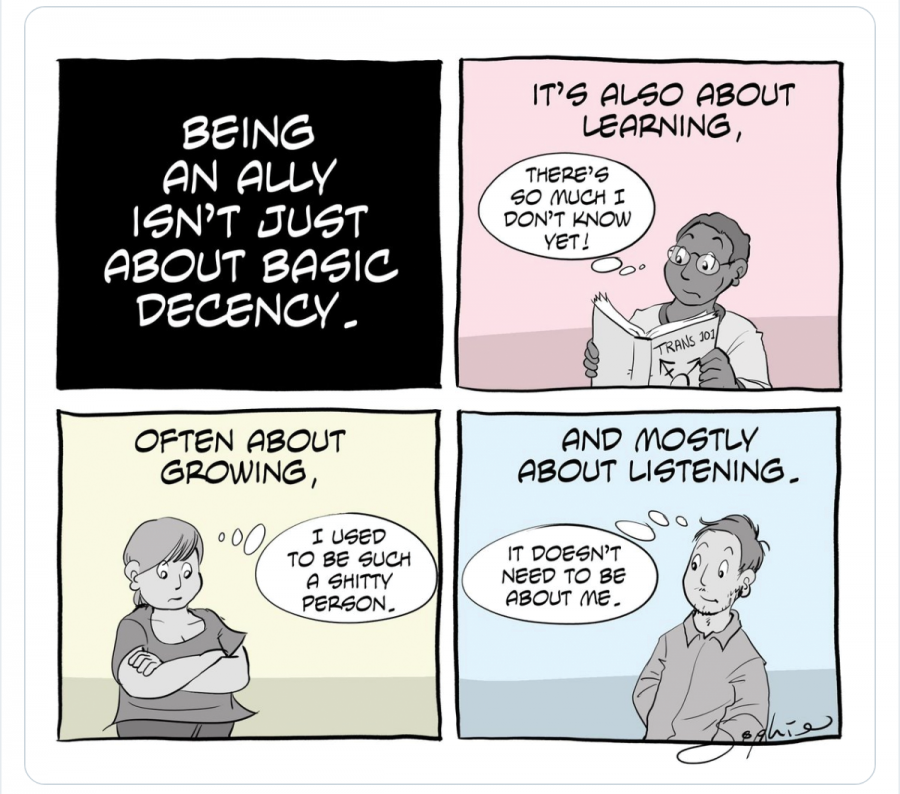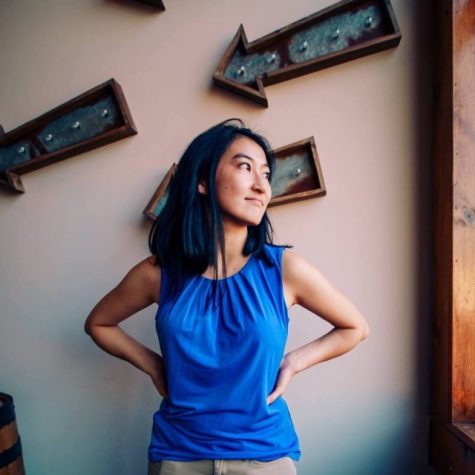My personal practice in pronouns
November 5, 2019
I don’t want people to make assumptions about who I am. I may look like a middle-class Asian American woman who is good at math, bad at driving (“bad” at driving), studious, quiet and, for the most part, will not bother other people just so that I don’t make too much noise and ruffle anyone’s feathers. And I am. And I do. But I also am and do many other things.
Hence, every chance I get to throw people off, I will, even if only for fun and even to the point where I have started to think that my habit of making jokes about being Asian in front of non-Asians may in fact be some sort of complex that I’ve developed from unprocessed, internalized racism. But hey, it’s hard being human in the modern world. We all regularly have to question and reexamine, in both others and in ourselves, assumptions, prejudices and neuroses caused by the desires repressed by the late capitalist social formation in which we live.
A random East Asian-looking woman in a stock photo used in NEIU ads? It is me. I am every Asian woman, ever. Every East Asian professor on the faculty of NEIU? My dad. In a group chat, my friend asks, “How can you be every Asian woman if Scarlett Johansson is already every Asian woman?” Well, that’s a very good question. And the answer is that Scarlett Johansson is also me (and to follow that answer to its logical conclusion, I am also every person, every tree and every animal). Does my social world assume and perpetuate the anonymity, interchangeability and painfully loud, stifling silence of speechless Asian women? Well then, I will only lean in further (as a joke, anyway).
We live in an incredibly complicated world and everyone has a complex interior life. We all know this. It’s fun to be full of surprises, even when they are stupid, trivial and meaningless, only if to remind others around us that a human being is not an appearance, a type or a cluster of unspoken, unexamined beliefs projected onto oneself by our social world.
Wednesday, Oct. 17, 2018 marked the inaugural celebration of International Pronouns Day. We continue to observe this day annually on the third Wednesday of Oct. both here at NEIU and around the world (on Oct. 16 this year). Luca Maurer wrote for Advocate.com that “International Pronouns Day seeks to take one small yet important step to build awareness and action about the protective and positive outcomes of using pronouns that individuals determine for themselves.”
To normalize the use of sharing third person pronouns is to lessen the effects of stigma and discrimination faced by the transgender community that contribute to their marginalization and invisibility. The consequences of stigma and discrimination are dire; aside from material discrimination, such as physical violence and socioeconomic hardship, marginalized transgender people are at greater risk of mental health problems to the point of suicidal ideation.
Communicate your third person pronouns. We do this to notify others how to perceive us. My choice to do so currently only manifests in listing “she/her/hers” in my email signature. But I do it because there is no reason to assume that my passing for cisgender heterosexual (the most vanilla gender-sexuality combination possible) means that someone can make that assumption about me prior to getting to know me. There is also no reason, in many daily interactions, for people to know how I identify in terms of gender and sexuality. I can choose to tell others my pronouns ahead of time, but if I don’t, I expect to be asked. I know others don’t have it as easy as I do in terms of presentation and inner reality because I understand gender and sexuality are not a choice.
This sort of self-naming can seem like a purposeless form of political correctness. But if you think it is courageous in a rebellious way to throw political correctness to the wind, you end up advocating for political wrongness. Political wrongness? What would the point of that be? Does political wrongness require an extraordinary fearlessness? Would you get the sense that you are exceptional, unusually brave for making assumptions about how people identify themselves so that they can be coherent to the social world? Reading people as they appear and not as they tell you they want to be interpreted is not taking the hard road, it’s simply refusing to take people as they want to be taken and instead insisting on taking them how you want to take them.
I use pronouns in order to stand firm in my solidarity with the transgender community. But what does this small act of solidarity imply for me? It reminds me that in being heard in one’s self-expression, both one’s personhood and one’s agency are acknowledged, and that in the complications of humanity, I share with the transgender community the insistence that we will be seen and embraced in the way that we know ourselves, in the way that we are– and only in the way that we are– and in the fullness of our dignity.








